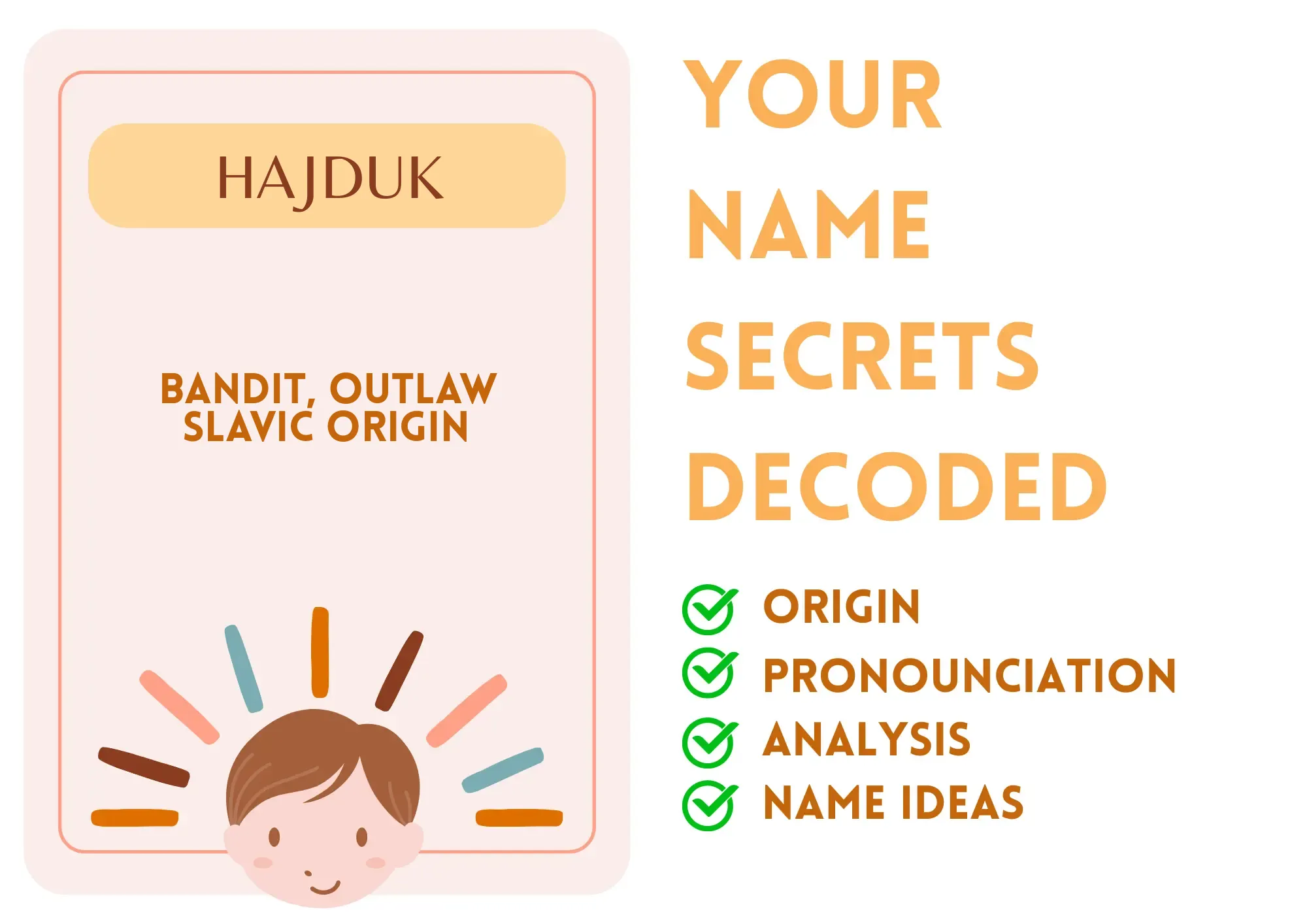
Hajduk
Hajduk is a name with Slavic roots, meaning 'bandit' or 'outlaw', historically associated with freedom fighters in the Balkans, especially in Serbia and Croatia. The term expresses a sense of rebellion against oppression and celebrates a spirit of independence. While traditionally masculine, Hajduk can also be considered unisex. The name carries historical significance through its association with the Hajduk movement, which embodied the struggle for freedom and national identity during times of foreign rule.
The name Hajduk is regarded positively, symbolizing bravery, freedom, and defiance against injustice. It is somewhat easy to write and pronounce, though it may be less familiar to those outside of Slavic cultures. Common nicknames might include Haj, Duki, or Duke.
In popular culture, Hajduk is often referenced in folklore, literature, and songs celebrating the heroes of the past. Because of the name's strong connotations, many people may associate it with a fierce individualism and a historical legacy of resistance.
Basic Information
Gender: Boy
Sounds Like: HAI-dook
Pronunciation Explanation: The name is pronounced with the emphasis on the first syllable 'HAI', while the second syllable 'dook' sounds like 'duke'.
Summary and Meaning
Meaning: bandit, outlaw (Slavic origin)
Origin: Hajduk has its origins in the Slavic language and is primarily associated with Balkan history.
Usage: Hajduk is predominantly a masculine name but can be used in a unisex context depending on cultural interpretation.
Name Number (Chaldean)
Name Number (Pythagorean)
Popularity (Global Rank)
Overall: 206887
Boys:
Most Popular in
Religious and Cultural Significance
Religion: Christian
Background: Hajduk is predominantly used within Christian contexts in Slavic cultures, representing values such as bravery and independence.
Cultural Significance: The name is deeply rooted in the cultural heritage of the Balkan region, embodying pride and national identity.
Historical Significance: During the Ottoman Empire's expansion into the Balkans, Hajduks emerged as folk heroes who resisted oppression and fought for local autonomy, thus carving an important niche in the historical narrative of South Eastern Europe.
Popular Culture
Literature and Mythology: Hajduk figures prominently in various folk stories and legends, often depicted as heroes who stand against tyranny.
Movies and Television: The name appears in a variety of films and television shows, where characters with the name embody the themes of rebellion and individualism, often against state oppression.
Feelings and Perceptions
Perception: Hajduk is generally perceived as a bold and adventurous name, evoking feelings of pride, courage, and resistance against tyranny. It embodies a strong connection to historical narratives of freedom.
Positive Feelings: Fierce, brave, independent, adventurous, heroic.
Negative Feelings: May feel overly aggressive or unfamiliar to some, especially outside of Slavic cultural contexts.
Practical Considerations
Ease of Writing and Calling: Hajduk is relatively easy to pronounce for those familiar with Slavic names. However, the unique spelling may pose a challenge for others, leading to potential mispronunciations.
Common Typos and Misspellings: Hajduk,Haiduk,Hajdook,Hajdack
Common Nicknames: Haj,Haji,Duki,Duke
Hajduk Popularity
Hajduk Usage and Popularity By Country
| Country | Rank (Overall) |
|---|---|
| Montenegro | 1785 |
| Slovakia | 2638 |
| Poland | 3487 |
| Hungary | 4743 |
| Serbia | 5467 |
| Ecuador | 20961 |
| Romania | 23595 |
| Argentina | 34935 |
| Germany | 81441 |
| United Kingdom | 118019 |
Hajduk Usage and Popularity By City
| City | Rank (Overall) |
|---|
Compatibility Analysis
Famous Persons Named Hajduk
No results found for Hajduk.
Related Names
Similar Sounding Names:
Haduk,Hajd,Haji,Hajer